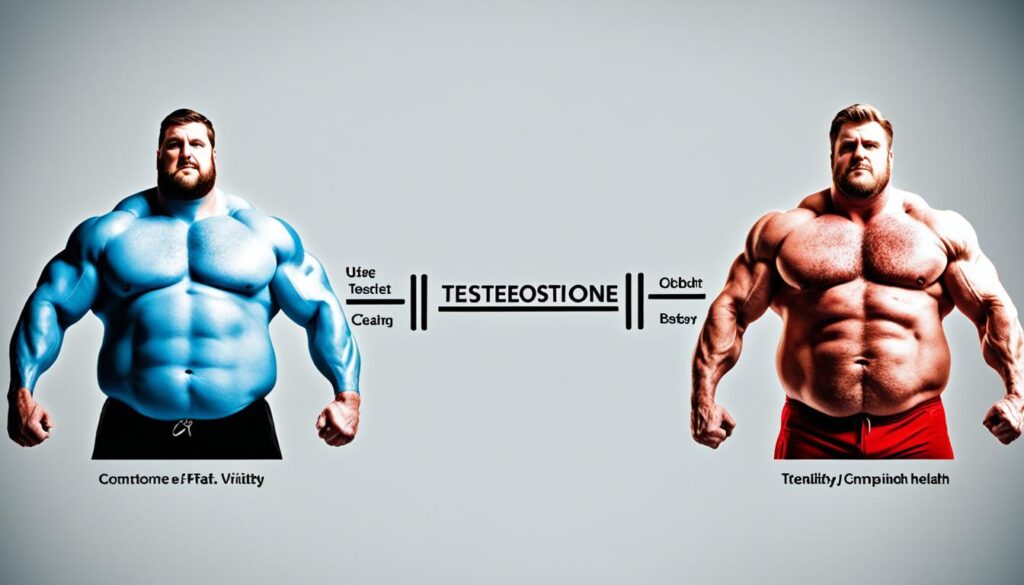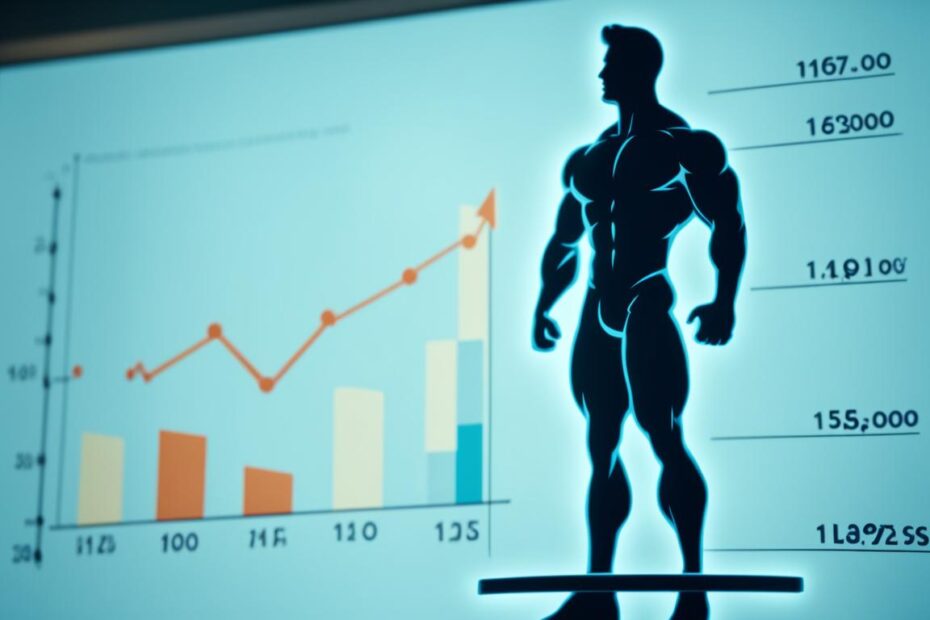I’ve always wondered about the link between body fat and low testosterone. This topic is getting focus in the health world lately. When we look into it, we find that testosterone and weight loss go hand in hand. Keeping a healthy lifestyle helps boost testosterone.
Recent studies have talked more about this interesting link. A study with over 900 middle-aged men with prediabetes showed something surprising. At the start, one in four had low testosterone. But after a year of changing their lifestyle, this reduced to only 11%. That’s a big 46% decrease!
This study is a big clue that our bodies love it when we make healthy changes. The men in the study lost an average of 17 pounds. Their testosterone levels got better with their weight going down. This shows losing weight can really help the body make more testosterone.
Understanding the Relationship Between Obesity and Testosterone
Obesity and low testosterone go hand in hand. Studies show that obese men often have low testosterone. And those with low testosterone are more likely to get obese. So, keeping a healthy weight is key to keeping your hormones in balance.

The Impact of Body Fat on Hormone Production
Extra body fat can hurt how much testosterone a body makes. Fat cells do more of something called aromatase activity. This turns testosterone into estrogen. It leads to less testosterone and can start a tough cycle.
How Excess Weight Affects the Endocrine System
Being too heavy can make your body more inflamed. This swelling brings up cytokines. They could mess up the hormone system and lower testosterone made. So, losing weight becomes really important for keeping your hormones right.
The Role of Aromatase in Testosterone Conversion
Fat tissue has a special enzyme called aromatase. It changes testosterone to estrogen. With more fat, there’s more of this happening. That’s why handling your weight matters a lot for keeping testosterone at a good level.
After 40, obese men are much more at risk of low testosterone, studies found. This shows how closely weight and hormones are linked. Losing weight is crucial if you want to boost your testosterone.
Will Weight Loss Increase Testosterone?
Research shows losing weight can up testosterone in overweight guys. When you drop weight, your hormone balance improves. This is good news if you’re looking to boost your testosterone.

In a recent study, men who lost 15% of their weight saw better sex function and testosterone. This study made me see how powerful losing weight can be for your hormones.
So, can losing weight help you make more testosterone? Yes, for sure. As you get lighter, your body gets better at making and using testosterone. This helps you get stronger and lose more fat, keeping your weight in check.
Diet and exercise can raise your testosterone. Eating nutrient-packed foods and working out can improve how your body makes hormones. Here are some great things about this approach:
- Less body fat means your testosterone doesn’t turn into estrogen as much
- Being better at processing sugar helps make the right amount of hormones
- More muscle helps with testosterone levels
- Sleeping better keeps your hormones in line
When you lose more weight, your testosterone goes up a lot. But, even losing a little weight can help. So, start getting healthy to see your testosterone rise.
The Science Behind Weight Loss and Hormone Balance
Managing weight for healthy hormones is more than just losing weight. It’s about the tricky link between shedding fat and keeping hormones right. Let’s look at the science behind this topic.
Breaking the Cycle
Low testosterone can mix with gaining weight in a not-so-great way. This cycle can make losing weight harder. But, we can turn things around by aiming for fat loss. This boosts our hormones in a good way.
Fat Loss and Testosterone
Studying the connection between losing fat and better testosterone is clear. A review of 24 studies found that losing weight helps up testosterone. Both dieting and surgery saw good results, with surgery impacting more due to bigger weight drops.
Long-Term Success
To keep our hormones healthy, lasting weight control is vital. The Diabetes Prevention Program showed that cutting belly and under-skin fat helps raise testosterone. So, being a healthy weight over time is key for good hormone levels.
Learning these ties helps us make wise choices for better health. Focusing on losing fat for the long run helps more than just our looks. It helps create the right balance of hormones in our bodies.
Effective Strategies for Boosting Testosterone Through Weight Loss
I found some great ways to raise testosterone through diet and losing weight. A key to a higher testosterone is living healthy, starting with losing extra weight. Did you know big men are more likely to have low testosterone? That’s right! Dropping weight can really boost your testosterone.
Here’s how to boost testosterone and lose weight effectively:
- Cutting calories helps raise testosterone.
- Strength training increases testosterone too.
- Getting enough sleep is important.
- Lower stress to prevent testosterone from dropping.
- Eating foods high in zinc is crucial.
Using all these tips together can do wonders. Research shows that changing your lifestyle is better than medicines at raising testosterone. By losing just 15% of your body weight, you can get a lot healthier and feel better.
Improving your diet is more than just what you eat – it’s a lifestyle change for more testosterone. By aiming for weight loss, eating right, and working out, you can naturally up your testosterone. This will make you feel better all around.
Exercise and Its Effect on Testosterone Production
Do you know that exercise is key for making more testosterone? Different workouts affect our hormone levels in special ways. Let’s see how various exercises can help increase testosterone. We will also look at how you can make the best exercise plan for your hormones.
Resistance Training vs. Aerobic Exercise for Hormone Optimization
Lifting weights is great for your testosterone. Studies show that lifting weights helps your testosterone, mainly in men. This boost can last from 15 minutes to an hour after you exercise. Aerobic exercises, on the other hand, help lower body fat. This supports keeping your testosterone at healthy levels.
The Optimal Exercise Routine for Increasing Testosterone
To get the best out of your exercise for testosterone, remember these tips:
- Focus on full-body workouts rather than isolating muscle groups
- Lift heavier weights with fewer repetitions
- Include high-intensity interval training (HIIT) in your routine
- Aim for at least 150 minutes of moderate-intensity exercise per week
Avoiding Overtraining and Its Impact on Hormones
Exercising too much can hurt your testosterone. Signs of overdoing it include feeling too sore, not recovering well, and doing worse in exercises. To avoid this, make sure to rest enough between your workouts. And always listen to what your body is telling you. A balanced way of exercising is crucial to keep your hormones in check.
Nutritional Approaches to Support Testosterone and Weight Loss
Nutrition is key in making more testosterone through diet. Eating well supports making hormones and losing weight. A diet low in calories can help testosterone go up while you lose weight.
Focusing on food that’s rich in protein saves your muscle when you’re losing weight. This keeps your testosterone levels healthy. I eat things like lean meat, fish, and plants. But, helping your testosterone needs more than just what you eat.
I’ve learned that tiny nutrients are also big for your hormones. Zinc, vitamin D, and omega-3 fats all help make testosterone. I try to eat these from real food. Less junk and sugar is good for your weight and hormones.
Mixing these food ideas with moving more gets me better at managing weight and testosterone. It shows me how powerful food is for our hormones!
